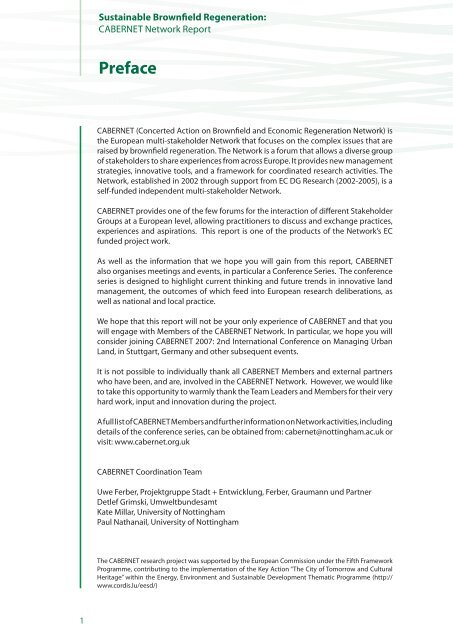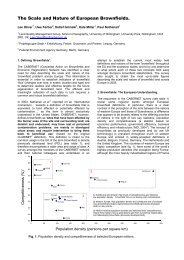Sustainable Brownfield Regeneration: CABERNET Network Report
Sustainable Brownfield Regeneration: CABERNET Network Report
Sustainable Brownfield Regeneration: CABERNET Network Report
You also want an ePaper? Increase the reach of your titles
YUMPU automatically turns print PDFs into web optimized ePapers that Google loves.
<strong>Sustainable</strong> <strong>Brownfield</strong> <strong>Regeneration</strong>:<br />
<strong>CABERNET</strong> <strong>Network</strong> <strong>Report</strong><br />
Preface<br />
<strong>CABERNET</strong> (Concerted Action on <strong>Brownfield</strong> and Economic <strong>Regeneration</strong> <strong>Network</strong>) is<br />
the European multi-stakeholder <strong>Network</strong> that focuses on the complex issues that are<br />
raised by brownfield regeneration. The <strong>Network</strong> is a forum that allows a diverse group<br />
of stakeholders to share experiences from across Europe. It provides new management<br />
strategies, innovative tools, and a framework for coordinated research activities. The<br />
<strong>Network</strong>, established in 2002 through support from EC DG Research (2002-2005), is a<br />
self-funded independent multi-stakeholder <strong>Network</strong>.<br />
<strong>CABERNET</strong> provides one of the few forums for the interaction of different Stakeholder<br />
Groups at a European level, allowing practitioners to discuss and exchange practices,<br />
experiences and aspirations. This report is one of the products of the <strong>Network</strong>’s EC<br />
funded project work.<br />
As well as the information that we hope you will gain from this report, <strong>CABERNET</strong><br />
also organises meetings and events, in particular a Conference Series. The conference<br />
series is designed to highlight current thinking and future trends in innovative land<br />
management, the outcomes of which feed into European research deliberations, as<br />
well as national and local practice.<br />
We hope that this report will not be your only experience of <strong>CABERNET</strong> and that you<br />
will engage with Members of the <strong>CABERNET</strong> <strong>Network</strong>. In particular, we hope you will<br />
consider joining <strong>CABERNET</strong> 2007: 2nd International Conference on Managing Urban<br />
Land, in Stuttgart, Germany and other subsequent events.<br />
It is not possible to individually thank all <strong>CABERNET</strong> Members and external partners<br />
who have been, and are, involved in the <strong>CABERNET</strong> <strong>Network</strong>. However, we would like<br />
to take this opportunity to warmly thank the Team Leaders and Members for their very<br />
hard work, input and innovation during the project.<br />
A full list of <strong>CABERNET</strong> Members and further information on <strong>Network</strong> activities, including<br />
details of the conference series, can be obtained from: cabernet@nottingham.ac.uk or<br />
visit: www.cabernet.org.uk<br />
<strong>CABERNET</strong> Coordination Team<br />
Uwe Ferber, Projektgruppe Stadt + Entwicklung, Ferber, Graumann und Partner<br />
Detlef Grimski, Umweltbundesamt<br />
Kate Millar, University of Nottingham<br />
Paul Nathanail, University of Nottingham<br />
The <strong>CABERNET</strong> research project was supported by the European Commission under the Fifth Framework<br />
Programme, contributing to the implementation of the Key Action “The City of Tomorrow and Cultural<br />
Heritage” within the Energy, Environment and <strong>Sustainable</strong> Development Thematic Programme (http://<br />
www.cordis.lu/eesd/)<br />
1






